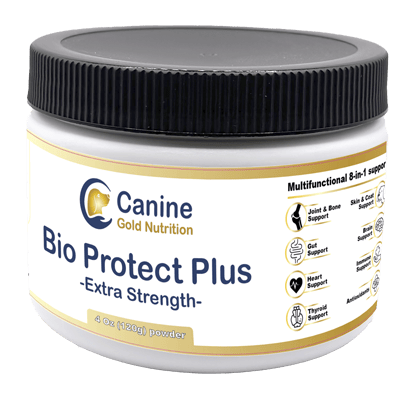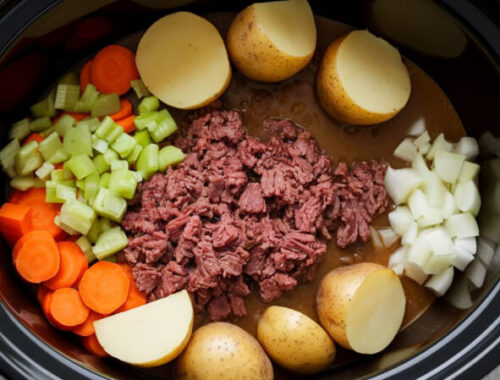Your Dog’s Gut Health: A Friendly Guide for Pet Parents

Hey there, fellow dog lovers! If you’re reading this, chances are you’re as obsessed with your pup’s well-being as I am with mine.
We all know that keeping our dogs happy and healthy is a top priority, but one area that often gets overlooked is their gut health.
Yep, that’s right—our furry friends’ digestive systems are just as important as their pattering paws, wagging tails, and puppy dog eyes.
So, let’s dive into the fascinating world of canine gut health and learn how we can keep our four-legged companions’ digestion in tip-top shape!
{Affiliate links included below}
What is Gut Health Anyway?
Put very simply, gut health refers to the balance of microorganisms that live in the digestive tract.
These microorganisms, often called the gut microbiome, play a super important role in your dog’s overall health.
A healthy gut microbiome helps with digestion, supports the immune system, and even influences mood and behavior. Just like in humans, a happy gut means a happy dog!
Signs of a Healthy Gut
First things first, how do you know if your dog has a healthy gut? Here are a few signs to look out for:
- Regular, Firm Stools: Consistent and well-formed poops are a good indication that your dog’s digestive system is functioning properly.
- Good Appetite: A healthy gut usually means your dog will have a good appetite and enjoy mealtimes.
- Energy Levels: If your dog is lively and playful, that’s a sign they’re feeling good on the inside.
- Healthy Weight: Maintaining a healthy weight is a sign of proper nutrient absorption.
- Shiny Coat and Healthy Skin: A well-balanced gut can reflect in your dog’s skin and coat condition.

Signs of Gut Issues
On the flip side, here are some signs that your dog’s gut might need some attention:
- Diarrhea or Constipation: Irregular or poor stool quality can indicate digestive issues.
- Gas and Bloating: Excessive gas or a bloated belly can be signs of an upset stomach.
- Vomiting: Frequent vomiting is a red flag that something isn’t right.
- Lack of Appetite: If your dog suddenly isn’t interested in food, it could be a sign of gut problems.
- Weight Loss or Gain: Unexplained changes in weight can be a sign of poor nutrient absorption or other health issues.
How to Support Your Dog’s Gut Health
Now that we know what to look for, let’s talk about how we can keep your dog’s gut in great shape. Here are some tips:
- Feed a Balanced Diet: Quality dog food with the right balance of proteins, fats, and fibers is crucial. Look for foods with natural ingredients and avoid fillers like corn and soy. This is one of the top-rated natural dry dog foods for gut health.
- Probiotics and Prebiotics: Probiotics are beneficial bacteria that can help maintain a healthy gut lining. Prebiotics, on the other hand, are fibers that feed these good bacteria. Think of them as the food for the probiotics! This veterinarian formulated supplement is our #1 recommendation for supporting gut health.
- Regular Exercise: Keeping your dog active helps stimulate digestion and overall well-being. Plus, it’s a great way to bond with your pup.
- Hydration: Always make sure your dog has access to fresh water. Proper hydration is essential for digestion and overall health.
- Avoid Table Scraps: Human food can sometimes be hard on your dog’s digestive system and can lead to imbalances in the gut microbiome. It’s best to stick to dog-friendly treats and foods.
- Routine Vet Check-ups: Regular vet visits can help catch any potential issues early on. Your vet can also give personalized advice for your dog’s specific needs.
The Role of Stress
Just like us, dogs can get stressed out, and guess what? Stress can wreak havoc on their gut health.
Big changes like moving to a new house, a new family member (two-legged or four-legged), or even a change in routine can stress your dog out.
Try to keep their environment as stable and comforting as possible, and give them lots of love and reassurance during any transitions.
Giving your dog a fun toy can help relieve stress and provide extra play for your pet.
Closing Thoughts on Dog Gut Health
In a nutshell, keeping an eye on your dog’s gut health is just as important as regular walks and belly rubs.
By ensuring they have a balanced diet, regular exercise, and a stress-free environment, you can help keep their digestive system healthy and happy.
Remember, a healthy gut means a happier, more energetic pup!
So, next time you’re at the pet store or chatting with your vet, don’t hesitate to ask about gut health.
Your dog will thank you with endless tail wags and sloppy kisses. Happy pet parenting!






